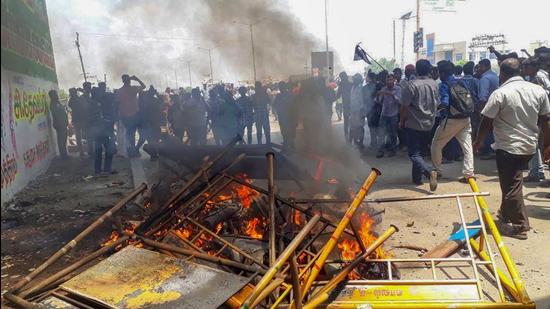Thoothukudi: A timeline of protest and vindication
The Supreme Court has ruled that Sterlite Copper’s plant will remain shut, after citing repeated breaches and serious violations on the part of owners, Vedanta
Let's start at the beginning here.

In 1994, the All India Anna Dravida Munnetra Kazhagam (AIADMK) government of Tamil Nadu, led by the now deceased J. Jayalalithaa approved a copper smelting plant to be run by Vedanta-owned Sterlite Copper. Two years later, the plant began operations. Pretty soon, the residents of Thoothukudi began to complain of pollution and health problems like difficulty breathing, and throat and eye problems.
The protests they started in 1996 went on for decades. The 400,000 tonne capacity copper smelting plant has been at the centre of the controversy over its pollution of the air and water in the locality.
In 1998, following an order of the Madras HC, the plant was shut down, but it reopened after a month when the company agreed to take measures to stop pollution.
In 2008, the medical college in neighbouring Tirunelveli district published a report stating that 50% of the people around a 5km radius of the factory die of diseases and chronic illness, 50% of women are anaemic and 49% of school children are underweight.
In 2013, the Supreme Court fined the company ₹100 crore for polluting the area following a gas leak from the plant that took place on on March 23 that year.
By 2018, the protests were simply not dying down.

On May 22 of that year, the protestors marked 100 days of a fresh bout of a citizens protest, this time against the proposed expansion of the Sterlite Copper smelter plant. Residents of Kumareddiyapuram started a sit-in protest at the site in February; on May 22, members of the anti-Sterlite people's movement decided to stage their protest at the Thoothukudi district collectorate. However, the police under the then AIADMK government (this time, led by Edappadi Palaniswami) shot at them, killing 13 civilians. The police firing that began at noon, lasted till 1.30 pm. Another round of police firing occurred against the protestors at 3 pm in Threspuram in central Thoothukudi.
The following day, the Sterlite Copper plant was closed down. The National Human Rights Commission (NHRC) took suo motu cognizance of the incident.
A judicial commission led by retired justice Aruna Jagadeesan was formed to probe the police excesses, and by October 2018, the NHRC closed the case as compensation was paid to all the victims' families.
The report by the Justice Aruna Jagadeesan Commission, however, was only tabled in the Tamil Nadu assembly in October 2022, when the Dravida Munnetra Kazhagam (DMK) was in power. The report contended that the police firing could have been prevented had the then chief minister acted on the information conveyed to him by Intelligence Officer KN Santhiyamurthy to diffuse the volatile situation in Thoothukudi. The report concluded that the police excesses were unprovoked and the intelligence was met with lethargy and indifference from those occupying the highest seats in power.
Interestingly, in the midst of the sit-in by the protestors in 2018, Sterlite's consent to operate (CTO) expired on March 31. The Tamil Nadu Pollution Control Board (TNPCB) rejected the company's application to renew its CTO, citing non-adherence to agreed safety measures and effluent management.
The National Green Tribunal, however, allowed the plant to reopen in December 2018, but the Supreme Court stayed the order in January 2019. Vedanta was given the liberty to approach the Madras high court, but the HC refused to order the reopening of the plant in 2020.
“The petitioner has been consistently stating that if their plant is shut the requirement of copper in India cannot be met, it will be a great blow on the economy, etc. The Courts have held that when it comes economy pitted against environment, environment will reign supreme,” Madras High Court judges TS Sivagnanam and V Bhavani Subbaroyan wrote in the voluminous 815-page order..
Following this, Sterlite moved the Supreme Court. The verdict was finally delivered on February 29.
In 2021, during the severe oxygen shortage crisis across India during the second Covid-19 wave, Vedanta had moved the Supreme Court to allow them to reopen the Sterlite plant in Thoothukudi to make medical grade oxygen, which was accepted with several conditions. The plant operated for three months until the second wave had subsided and the premises were shut again.
In June 2022, the company issued a notification inviting Expression Of Interest (EOI) to sell the smelter and refining complex situated in Thoothukudi.
Following the Supreme Court's recent verdict, the plant will remain shut and the locals in Thoothukudi stand vindicated.
All Access.
One Subscription.
Get 360° coverage—from daily headlines
to 100 year archives.



HT App & Website







